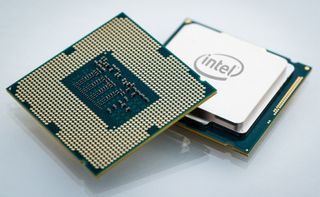Intel Raptor Lake CPUs could outgun AMD with rumored boost of up to 5.8GHz
Are we set to get ridiculously fast clocks with Intel’s next-gen flagship?

Intel’s Core i9-13900K, its next-gen flagship processor (presumably), could hit seriously fast Turbo speeds a good chunk higher than even the mighty 12900KS manages.
The Core i9-12900KS is the freshly released supercharged variant of the 12900K, and the CPU can boost to 5.5GHz right out of the box.
However, in theory, Intel’s 13th-gen Raptor Lake silicon will be capable of taking clock speeds 200MHz or 300MHz faster than this, as rumored by hardware leaker Raichu on Twitter.
RPL will over the new highest freq which was created by 12900KS.More 2-300 MHz is possible.April 13, 2022
In theory, then, the Raptor Lake flagship could end up hitting 5.7GHz or 5.8GHz, which would be pretty staggering speeds straight off the bat with no tweaking or knowledge of overclocking needed.
We’re talking about the boost for the CPU’s performance cores of course – the efficiency cores would run slower, as ever – and furthermore, the maximum speed for a pair of cores, too (you won’t get full pelt across all-cores, naturally; with the 12900KS, all-core boost tops out at 5.2GHz, 300Hz shy of the max Turbo).
Analysis: Raptor Lake could deliver quite a punch – but will Zen 4 land the first blow?
What isn’t clear is if when Raichu talks about Raptor Lake reaching these heights, whether they’re referring to the Core i9-13900K, or an eventual 13900KS higher-binned variant – if Intel even takes that route. (It doesn’t always make a ‘KS’ edition of the flagship, and in fact the last one before the 12900KS was the 9900KS, so three generations back).
Whatever the case, based on this rumor, the broad expectation is that we can anticipate Raptor Lake delivering a significant boost to clock speeds, and of course that won’t be all. A new generation will inevitably bring an IPC uplift (more Instructions per Clock means you get even more out of faster clock speeds), and even if Raptor Lake is only a straight refresh of Alder Lake, it has some interesting trimmings on the side. Like a major on-board cache boost to pep up gaming frame rates, for example.
Get daily insight, inspiration and deals in your inbox
Get the hottest deals available in your inbox plus news, reviews, opinion, analysis and more from the TechRadar team.
Let’s not forget that the 13900K is rumored to be upping the efficiency cores from 8 to 16 (while keeping the same 8 performance cores), so the flagship CPU will theoretically be a 24-core affair (with 32-threads, as efficiency cores don’t have hyper-threading). And that should give the CPU a little more oomph, too.
The upshot is that despite being just a basic refresh in theory, Raptor Lake could smooth out any rough edges in Alder Lake – which is Intel’s first real foray into hybrid cores, of course, Lakefield aside – to deliver quite a punch. Let’s hope so, although the other question here is whether AMD will get the first blow in by launching Zen 4 before Raptor Lake.
While Intel’s Raptor Lake has been rumored for a Q3 debut (multiple times), that’s not certain, and other speculation has contended that AMD may also be shooting to get next-gen Zen 4 processors out in Q3, possibly aiming to beat Intel to market. Which, to be fair, Team Red really needs to do if possible, because if Intel’s 13th-gen range turns up first, AMD’s Ryzen 5000 series is going to be left looking rather underpowered indeed.
Via Wccftech
Darren is a freelancer writing news and features for TechRadar (and occasionally T3) across a broad range of computing topics including CPUs, GPUs, various other hardware, VPNs, antivirus and more. He has written about tech for the best part of three decades, and writes books in his spare time (his debut novel - 'I Know What You Did Last Supper' - was published by Hachette UK in 2013).
